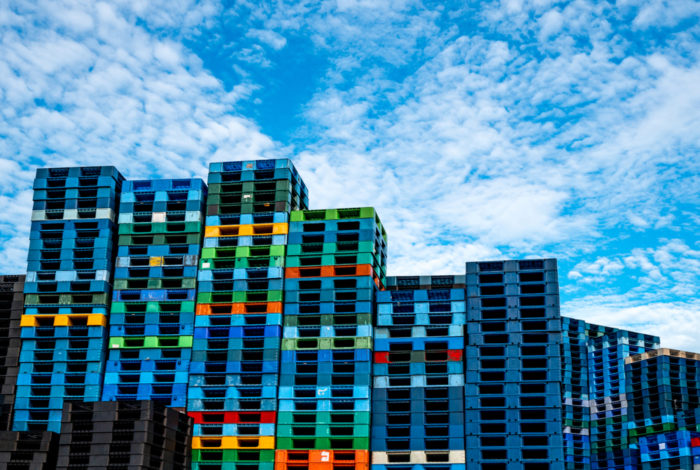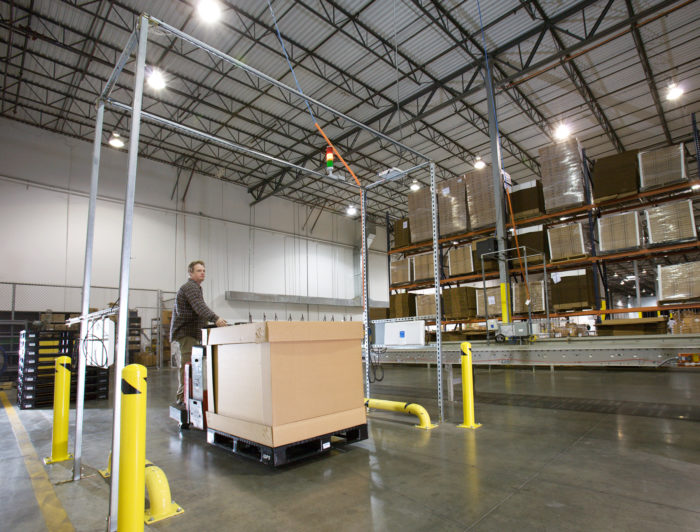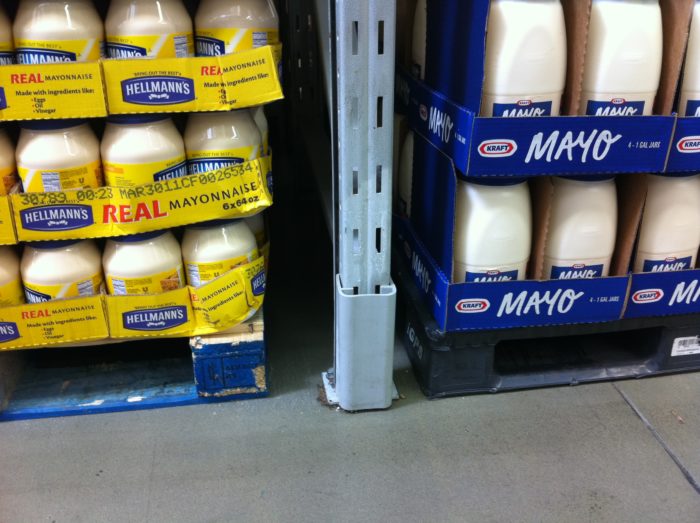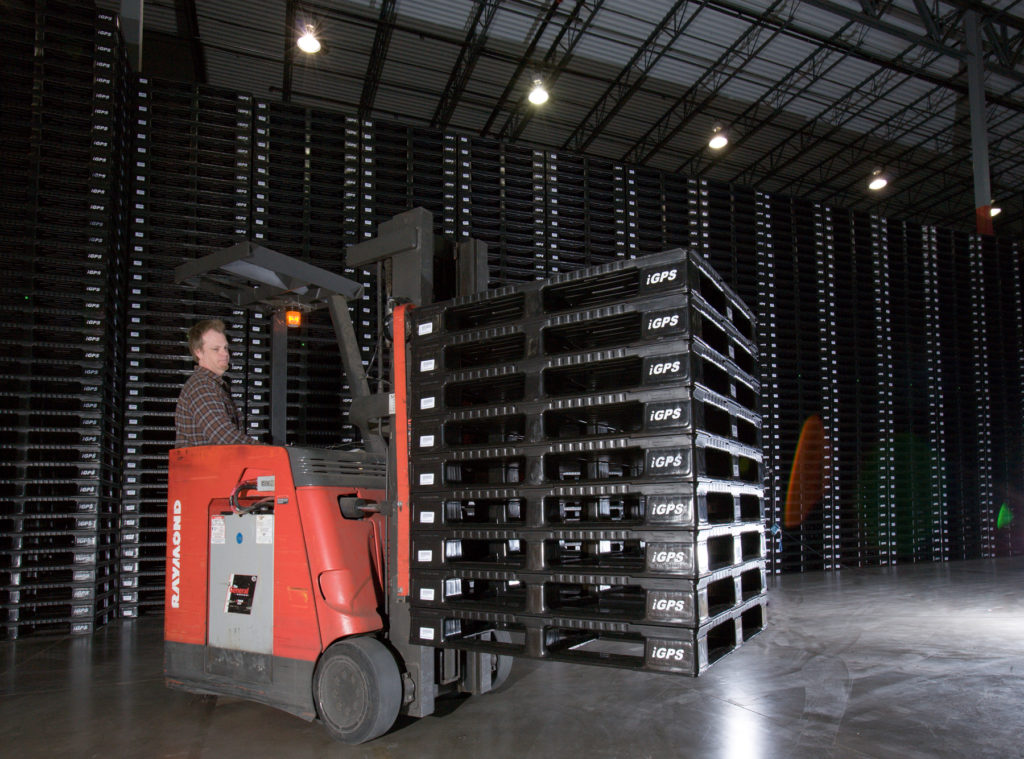UPDATED June 19, 2023
Color matters quite a bit for recycling plastic. The reason is that when different colors are recycled together, the result is either unreliable coloration—with the tint or hue being off—or an unattractive shade of brown, gray, or black. For this reason, the color black in HDPE plastic can be an indicator that the plastic contains recycled content. That’s because black pigment can be added to stain a batch of mixed-color plastic black. It’s simply easier and less expensive to make a consistent product out of a batch of plastic that has been dyed black than it is to sort recycled plastic by color. Recycling plastic this way makes it possible to reuse plastic cost-effectively to make products like iGPS’s black plastic pallets.
Comparing Recycled and Virgin Plastic Pallets

It’s harder to manufacture colored plastic pallets from recycled material than it is to create black pallets. Light-colored plastic pallets are generally made out of non-recycled or virgin plastic, converted directly from the plastic pellets that come from petroleum products manufacturers. While there is nothing inherently wrong with this—all plastic starts as virgin plastic, after all.
Both recycled and virgin HDPE plastic pallets are equally safe for use in shipping food.
For instance, plastic pallets made out of virgin high-density polyethylene (HDPE) plastic aren’t any more hygienic than those made out of recycled HDPE plastic. Both ultimately have the same resistance to moisture and easy-to-clean surface. Chemically, HDPE plastic doesn’t have the issues with chemical leaching found in some other plastics—such as acrylonitrile butadiene styrene (ABS)—and both recycled and virgin HDPE plastic pallets are equally safe for use in shipping food, including produce, meats, and dairy products.
Effectively, there isn’t any sustainable advantage to using virgin plastic pallets save for coloration. And maintaining that coloration means either using very selective—and expensive—recycling processes for sorting colored plastics, or not using recycled materials at all. This means that colored pallets made of virgin plastic give up one of the greatest advantages of using plastic pallets in the first place: that they can be made incorporating recycled materials from the very beginning.
Why Black Plastic Pallets Are Actually Green
 Choosing to make plastic pallets black rather than another color means that when they are initially manufactured they can easily incorporate recycled plastic items like used laundry bottles and other consumer packaging made of HDPE plastic. This helps the environment in two ways- Recycled plastics consume less energy during manufacture, and result in the release of less greenhouse gas, than processing feedstocks from natural gas and pumping petroleum out of the ground. The use of recycled content also provides a way to sequester used plastic packaging and keep it out of the environment. And of course, once these black plastic pallets from iGPS reach the end of their useful lives, they can then be used to make more pallets, offering true cradle-to-cradle recyclability.
Choosing to make plastic pallets black rather than another color means that when they are initially manufactured they can easily incorporate recycled plastic items like used laundry bottles and other consumer packaging made of HDPE plastic. This helps the environment in two ways- Recycled plastics consume less energy during manufacture, and result in the release of less greenhouse gas, than processing feedstocks from natural gas and pumping petroleum out of the ground. The use of recycled content also provides a way to sequester used plastic packaging and keep it out of the environment. And of course, once these black plastic pallets from iGPS reach the end of their useful lives, they can then be used to make more pallets, offering true cradle-to-cradle recyclability.
Food spills can be easily rinsed off of the surface of a plastic pallet, removing potential sources of cross-contamination from the supply chain.
In addition to recyclability, companies that use high-quality plastic pallets will enjoy advantages over wood such as:
- Lighter Weight: At around 50 pounds, plastic pallets weigh 35 percent less than equivalent wood block pallets, which can weigh up to 80 pounds, depending on moisture content. This lightweight reduces wear and tear on equipment and employees. It also reduces carbon emissions during transportation.
- Durability: Plastic pallets are stronger and more durable than wood and are capable of holding up to 30,000 pounds of static load and 5,000 pounds of dynamic load compared to a wood pallet’s 5,000-pound maximum static load and 2,800-pound dynamic load. They are also edge rackable to 2,800 lbs. Increased durability helps reduce product damage during transportation, resulting in less waste overall and a lower total cost of business (TCOB).
- Consistent Dimensions: Plastic pallets have more consistent dimensions than wood pallets, whose dimensions can vary depending on how the boards were cut during milling and the moisture content of the wood and the environment. Greater consistency in dimensions allows for more consistent packing and loading of trucks as well as fewer issues during the use of warehouse automation.
- Longer Worklife: Plastic pallets last 4 times longer than both wood stringer pallets (which can make two to three trips through the supply chain) and wood block pallets (which can make less than twenty trips). The upshot of plastic’s long useful lifespan is that less fuel is used to create each pallet and less energy is needed to maintain usable pallet inventories.
- Supply Chain Hygiene: One of the biggest advantages of plastic pallets is that they are easily cleaned with hot water and detergent, and they don’t absorb moisture, which leads to mold and mildew growth in wood pallets. Food spills can be easily rinsed off of the surface of a plastic pallet, removing potential sources of cross-contamination from the supply chain. Antimicrobial treatment can even be used to reduce bacteria levels on plastic pallets if a high level of sanitization is needed.
 Plastic can be sustainable if it is used in the right way. When plastic is recycled to create plastic pallets, it provides a model of how a material that isn’t generally thought of as friendly to the environment can be used in a sustainable way. A pallet pooling system can make plastic pallets even more environmentally friendly. A pallet pooling company like iGPS will process, inspect, wash, and transfer empty plastic pallets to nearby businesses for their use. The practice optimizes the transportation of pallets from the end of the supply chain back to the beginning, which reduces the amount of fuel needed to make the most effective use of the pallet. It also provides companies with a cost-effective pallet management strategy. At a time when many companies and organizations are struggling to develop sustainable, circular business models, iGPS black plastic pallet pooling is already providing a model for a sustainable future.
Plastic can be sustainable if it is used in the right way. When plastic is recycled to create plastic pallets, it provides a model of how a material that isn’t generally thought of as friendly to the environment can be used in a sustainable way. A pallet pooling system can make plastic pallets even more environmentally friendly. A pallet pooling company like iGPS will process, inspect, wash, and transfer empty plastic pallets to nearby businesses for their use. The practice optimizes the transportation of pallets from the end of the supply chain back to the beginning, which reduces the amount of fuel needed to make the most effective use of the pallet. It also provides companies with a cost-effective pallet management strategy. At a time when many companies and organizations are struggling to develop sustainable, circular business models, iGPS black plastic pallet pooling is already providing a model for a sustainable future.
The iGPS black plastic pallet features true cradle-to-cradle recyclability. Start building a more sustainable supply chain by switching to iGPS. Give our team a call at 1-800-884-0225, email a specialist at switch@igps.net, or visit our contact page.



